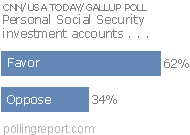Don't worry, Marc & I have it all figured out
Hopefully this post will make sense, but it may not. My printer is going nuts. I attempted to print out the Cato Institute report Marc posted, but it made the printer crash. Then I had to restart my computer and re-print. That worked for a few pages and then a page got stuck. Now, the printer is just running paper through and printing a line of nonsense marks along the tops of some but not all pages. It's very loud and distracting. But I think it's over.
It comes as no surprise that Congress is working diligently on behalf of the elderly. They vote, and we don't. And while that may change, we are fighting an uphill battle. The elderly already see the benefit of their political participation in the form of Medicare, Social Security and prescription drug benefits. Young people need to be convinced to believe that there are benefits of voting before they actual see any. But, we are a skeptical lot; so getting anybody even near our age to believe in anything that they can't see is no easy task. It may prove a fool's errand.

ANYWAY, I don't think there's a lot of debate that something must be done to government entitlement programs if they are going to exist in any form by the time our age group is able to take advantage of them. Since poverty numbers among seniors have been dwindling (in 1959 35% of the elderly lived in poverty, compared to just 27% of the overall population. In 2001 that number was down to 10%, compared to 12% of the overall population) we need to re-examine if the elderly, as a group, should be considered as being in need of assistance. Make no mistake, poverty-stricken old people do, should and will continue to get government benefits. What we're talking about here are those citizens, who because of their age but in spite of their wealth still receive large government benefits. That practice needs to be curtailed. The government needs to cease discussion on a prescription drug benefit for seniors, and focus instead on one for poor seniors, and poor people in general. Further, Medicare must be means-tested, to prevent those wealthy seniors from getting assistance that they don't really need.
Social Security, the notorious third rail of contemporary American politics, is a program in need of drastic overhaul. Aside from the rather academic discussion of a Social Security "lockbox," serious reforms are imminent. There have been a number of reforms bandied about in the last few years. Slashing benefits, raising payroll taxes, privatizing the whole system, raising the retirement age have all been among them. The system is going to crash once Baby Boomers retire, because boomers, unlike their "greatest generation" parents had fewer children. There will be less people to pay fore more retirees.
I'm not 100% decided on any one mode of reform, although the first steps are clear. With the advances of medicine, the retirement age can easily be moved to 70. (In reality, the retirement age discussion is almost irrelevant. Whether or not the age is raised on Social Security benefits or not, our age group will likely never be able to retire.) It seems to me, however, that the nature of the failures of this system would lead one to privatization as the answer. The government could substantially reduce payroll taxes, allowing the system to continue to distribute gradually decreasing benefits to those that have paid into it. Eventually, the system will, to borrow a phrase from New Gingrich (who was actually referring to Medicare) "wither on the vine." Those workers who are not scheduled to receive any benefits will be able to invest (with the money they save on reduced payroll taxes) so that they can retire. I would support a social "safety net" for those who either don't invest or are careless with their money. The benefit would have to small enough, however, that it would encourage people to invest but large enough to allow people to live.
I think this solution would also help ease what I have heard referred to as the "investment gap." People in this country do not invest for their future, primarily because of entitlement programs like Social Security and Medicare. By eliminating or at the very least drastically reducing the size and scope of these programs, American workers will be forced to provide for their own future. I think the knowledge that they are responsible for themselves in their old age will also help many Americans live within their means.
Maybe I don't need that extra Hummer. Perhaps we could do without a wall-mounted plasma screen television. Honey, maybe you could play with a golf club made of less space-age material.
By doing this, however, we run the risk of stifling economic growth. If people save their money, rather than buy goods, particularly expensive consumer goods, the economy would suffer. But, and I'm no economist, I believe that the economy would eventually stabilize and adapt to the type of situation I've described.
Well, if that's not enough, here are some links related to Social Security reform:
Socail Security Reform.org: Seems to be run by the Heritage Foundation. Has a section that allows you to see what your benefits will look like based on your age and gender.
sscommonsense.org:A fairly non-partisan website examining the Socail Security reform debate.
ourfuture.org: A liberal website from the viewpoint of young Americans. Details a number of issues and problems, how increased government can help to solve almost all of them.
Peace, Love and Means-Testing,
Tony
Posted by thynkhard
at 11:51 AM EST
Updated: Saturday, 1 November 2003 12:03 PM EST
 Now for what you all came to see. What else could I possibly blog about today? Skins, baby, Skins. The team you love to hate. Everyone witnessed the shame that was the Dallas game. It goes without saying that this team is beyond terrible. They're miserable. They're lock-yourself-in-your-closet-and-cry-yourself-to-sleep bad. And they've been that way since Daniel Snyder took over. In fact, as Kornheisner notes in today's Washington Post, you can trace the Skins downward spiral to the day Norv Turner was fired with a 7-6 record. And yet now, it's somehow worse. Now there is an apparently very talented and undoubtedly tough quarterback who may never live up to his NFL potential because of the Balboa-esque beatings he continues to suffer each and every week. He left Sunday's game twice because of injuries, but like Rocky, he kept getting back up off the mat, eager for more punishment. However, for the Redskisn, unlike the Stallion, there will be NO happy ending. The Redskins will never be competitive while Daniel Snyder calls the shots. As long as this over-indulged billionaire is at the helm the team will continue to be run the way a fourteen year-old kid might run it. Big names, flashy pass plays and no victories. There is no chemistry, no discipline and no accountability on that team. And for me, there is no hope.
Now for what you all came to see. What else could I possibly blog about today? Skins, baby, Skins. The team you love to hate. Everyone witnessed the shame that was the Dallas game. It goes without saying that this team is beyond terrible. They're miserable. They're lock-yourself-in-your-closet-and-cry-yourself-to-sleep bad. And they've been that way since Daniel Snyder took over. In fact, as Kornheisner notes in today's Washington Post, you can trace the Skins downward spiral to the day Norv Turner was fired with a 7-6 record. And yet now, it's somehow worse. Now there is an apparently very talented and undoubtedly tough quarterback who may never live up to his NFL potential because of the Balboa-esque beatings he continues to suffer each and every week. He left Sunday's game twice because of injuries, but like Rocky, he kept getting back up off the mat, eager for more punishment. However, for the Redskisn, unlike the Stallion, there will be NO happy ending. The Redskins will never be competitive while Daniel Snyder calls the shots. As long as this over-indulged billionaire is at the helm the team will continue to be run the way a fourteen year-old kid might run it. Big names, flashy pass plays and no victories. There is no chemistry, no discipline and no accountability on that team. And for me, there is no hope.

 Cavaliers: 8.5
Cavaliers: 8.5 This is unfortunate: the new Dallas Stars alternate jersey. It's the stars of the constellation Taurus arranged over a bull's head. Barf.
This is unfortunate: the new Dallas Stars alternate jersey. It's the stars of the constellation Taurus arranged over a bull's head. Barf.
 Note that both
Note that both 









 A couple of the teams listed above changed their logo as well, including the Raptors going to a claw for their secondary logo and the Cavaliers new C-sword, which is reflected in the new uniform. However, the Rockets really improved their whole look by changing their logo to this snappy little number.
A couple of the teams listed above changed their logo as well, including the Raptors going to a claw for their secondary logo and the Cavaliers new C-sword, which is reflected in the new uniform. However, the Rockets really improved their whole look by changing their logo to this snappy little number. You know, when she's not on someone's payroll, she can say some pretty intelligent things. Brazile said
You know, when she's not on someone's payroll, she can say some pretty intelligent things. Brazile said